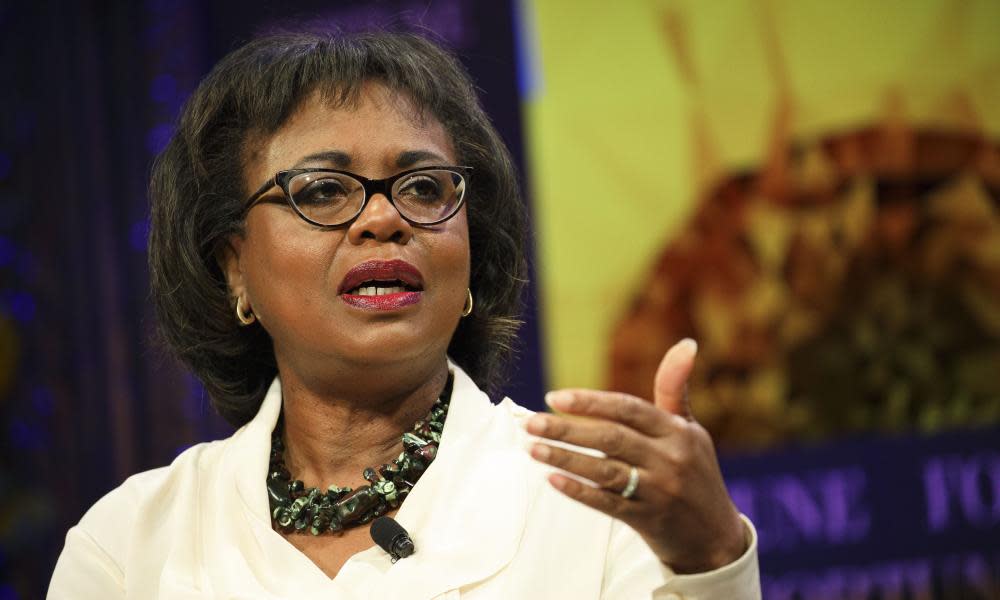Clarence Thomas accuser Anita Hill to spearhead fight against harassment in Hollywood

Anita Hill, who sparked a nascent national reckoning with sexual harassment when she testified during Clarence Thomas’s supreme court confirmation hearings in 1991, has been chosen to lead a commission on sexual misconduct organized and financed by some of the most prominent figures in Hollywood.
The Commission on Sexual Harassment and Advancing Equality in the Workplace will be charged with tackling “the broad culture of abuse and power disparity” in media and entertainment, a statement from its organisers said.
“The commission will lead the entertainment industry toward alignment in achieving safer, fairer, more equitable and accountable workplaces – particularly for women and marginalized people.”
Commission organisers some of the most powerful women in the film industry, including Kathleen Kennedy, president of Lucasfilm; Freada Kapor Klein, a venture capitalist and longtime advocate for sexual harassment victims; Nina Shaw, a Hollywood lawyer; and Maria Eitel, who co-chairs the Nike Foundation.
A meeting called on Friday attracted executives including Disney’s Bob Iger, Jim Gianopulos and Karen Stuart of Paramount, Netflix’s Ted Sarandos and Les Moonves of CBS. The agent Ari Emanuel, Screen Actors Guild president Gabrielle Carteris, and Dawn Hudson, CEO of the Academy of Motion Pictures, also attended.
Several major unions, guilds, and agencies have signed on to work with the commission, which will meet to decide its mission and scope at the beginning of 2018.
“The commission will not seek just one solution but a comprehensive strategy to address the complex and interrelated causes of the problems of parity and power,” said Kennedy.
The selection of Hill speaks to how sharply the culture has shifted around the topic of sexual misconduct in the workplace.
Hill, who is now a professor of law and social policy at Brandeis University, found herself in the national spotlight in 1991, around her gruelling testimony before a US Senate committee. Thomas had been Hill’s boss at the Equal Employment Opportunity Commission. She claimed he sexually harassed her but her questioning by the all-male committee was skeptical and derisive.
Her testimony became a flashpoint for some of the first national conversations around the gender politics of the workplace. The next year saw a surge of sexual harassment complaints and women running for political office.
In a recent interview with Teen Vogue, former senator and vice-president Joe Biden, who led the inquisition og Hill, said he wished he “had been able to do more” for her. He added: “I owe her an apology.”
In one of several addresses she made to entertainment leaders in the past week, Hill said she “never believed 1991 was the end, and I was going to make sure in my life that I never saw that as the defining moment for me or for this issue.”
The role that Hollywood’s biggest power brokers should play in the ongoing reckoning has been the subject of much debate, since the first revelations about producer Harvey Weinstein. In an interview with Oprah Winfrey, the actor Jennifer Lawrence said the industry’s highest echelon had an obligation to help protect the industry’s least powerful.
“How can there be rules in place where there are certain ways that you just cannot treat people?” she said. “If every A-list actor decides to join this commission, we know everybody in the industry.”
The announcement of the commission on Friday night drew wide praise.
“BEYOND ME TOO: A HISTORIC STEP,” wrote Jane Fonda in a representative tweet.
Others, though, such as Lexi Alexander, a director and frequent advocate for women and minorities to receive more opportunities in entertainment, viewed the commission as an empty gesture.
“Let’s create a commission with a bunch of agents who have enabled sexual harassment for years,” she wrote.
“Every agent knew,” Alexander wrote in another tweet, apparently referencing the dozens of Hollywood agents who were reportedly aware of Weinstein’s behavior. “Everyone of them. Any commission created with a bunch of heavyweight agents is BS. Even if Anita Hill is part of it. This is Hollywood at its best: creating an illusion. Journalists should know better.”
Most of the studios supporting and financing the commission have been exposed as places where sexism and harassment have run rampant. Since the first stories about Weinstein, accusations of sexual harassment or assault have toppled dozens of other power players and revealed a broad culture of complicity and enabling.
It’s a culture Hill is eager to dismantle.
“It is time to end the culture of silence,” she said. “I’ve been at this work for 26 years. This moment presents us with an unprecedented opportunity to make real change.”

 Yahoo News
Yahoo News 
